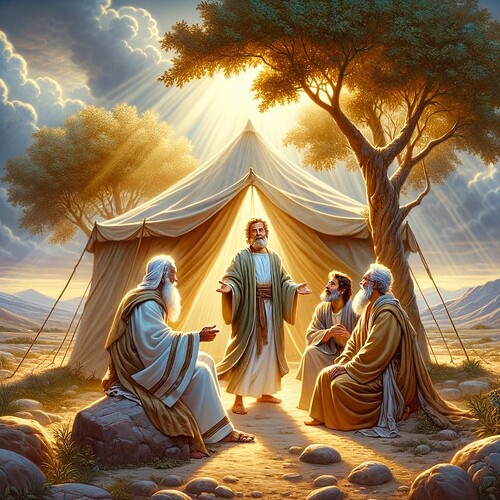 January 09: Genesis 17–18 — The Covenant of Circumcision and the Promise to Sarah
January 09: Genesis 17–18 — The Covenant of Circumcision and the Promise to Sarah
Faith, Promises, and Divine Encounters in Genesis 17 & 18
 Introduction
Introduction
Join us as we delve into Genesis 17 and 18, where God establishes His covenant with Abram and promises a son to Sarah. These chapters highlight the depths of faith and the complexities of divine-human interactions.
 Key Verse:
Key Verse:
“I will establish my covenant between me and you and will multiply you exceedingly.” — Genesis 17:2
“Is anything too hard for the LORD? At the appointed time I will return to you, according to the time of life, and Sarah shall have a son.” — Genesis 18:14
These verses underscore the power of God’s promises and the miraculous nature of His covenant.
 Key Themes and Reflections:
Key Themes and Reflections:
- The Covenant of Circumcision: Genesis 17 marks a significant moment where God establishes circumcision as a sign of His covenant with Abram and his descendants.
- The Promise to Sarah: In Genesis 18, Sarah receives the promise of a son, showcasing the power of faith and the fulfillment of God’s promises.
- Divine Hospitality: Abraham’s encounter with the three visitors highlights the importance of hospitality and reverence for the divine.
 Genesis 17: The Covenant with Abram
Genesis 17: The Covenant with Abram
This chapter presents a turning point in Abram’s journey, where he is renamed Abraham, signifying a new phase in God’s plan. The covenant of circumcision is established, marking a physical and spiritual bond between God and His chosen people.
 Hidden Gem:
Hidden Gem:
The change in Abram’s name to Abraham, meaning “father of many nations,” reflects not just a new identity but a destiny shaped by divine promise.
 Genesis 18: Sarah’s Promise
Genesis 18: Sarah’s Promise
In Genesis 18, Abraham’s hospitality to the three visitors sets the stage for the reiteration of the promise to Sarah. Despite her initial disbelief, the promise of a son signifies hope and miraculous intervention.
 Reflective Q&A:
Reflective Q&A:
![]() Genesis 17: The Covenant of Circumcision:
Genesis 17: The Covenant of Circumcision: ![]() Symbolism of Circumcision: What does circumcision represent in the context of God’s covenant with Abraham? A: Circumcision symbolizes the eternal bond between God and Abraham’s descendants, serving as a physical reminder of their unique relationship and responsibilities.
Symbolism of Circumcision: What does circumcision represent in the context of God’s covenant with Abraham? A: Circumcision symbolizes the eternal bond between God and Abraham’s descendants, serving as a physical reminder of their unique relationship and responsibilities.
![]() Implications of a New Name: How does Abraham’s name change reflect his role in God’s plan? A: The new name, Abraham, marks a transformation in his identity and mission, as he becomes the patriarch of a multitude of nations and a key figure in the unfolding of God’s salvation history.
Implications of a New Name: How does Abraham’s name change reflect his role in God’s plan? A: The new name, Abraham, marks a transformation in his identity and mission, as he becomes the patriarch of a multitude of nations and a key figure in the unfolding of God’s salvation history.
![]() Genesis 18: The Promise to Sarah:
Genesis 18: The Promise to Sarah: ![]() The Power of Divine Promise: What does the promise of a son to Sarah teach us about faith and God’s timing? A: The promise to Sarah illustrates the extraordinary nature of faith and God’s perfect timing. It teaches us that no situation is beyond God’s power to transform and fulfill His promises.
The Power of Divine Promise: What does the promise of a son to Sarah teach us about faith and God’s timing? A: The promise to Sarah illustrates the extraordinary nature of faith and God’s perfect timing. It teaches us that no situation is beyond God’s power to transform and fulfill His promises.
![]() Hospitality and Divine Encounters: What can we learn from Abraham’s hospitality towards the three visitors? A: Abraham’s warm reception of the visitors demonstrates the virtue of hospitality and reverence. It also shows that divine encounters can occur in unexpected ways, bringing significant revelations and blessings.
Hospitality and Divine Encounters: What can we learn from Abraham’s hospitality towards the three visitors? A: Abraham’s warm reception of the visitors demonstrates the virtue of hospitality and reverence. It also shows that divine encounters can occur in unexpected ways, bringing significant revelations and blessings.
 Join the Discussion:
Join the Discussion:
How do these chapters from Genesis influence your understanding of faith, promise, and divine intervention? Share your thoughts and reflections in the comments below!
#Covenant #Faith #Promise #DivineIntervention #BibleStudy #Genesis17 #Genesis18 #AIgniteScripture
![]() See You Tomorrow in Genesis: Continue exploring the rich narratives and lessons of Genesis with us. Join our journey for deeper insights into biblical stories and their relevance today.
See You Tomorrow in Genesis: Continue exploring the rich narratives and lessons of Genesis with us. Join our journey for deeper insights into biblical stories and their relevance today.
 Join the Forum!
Join the Forum!
Deepen your biblical understanding in our AIgniteScripture Community. Join discussions, access resources, and connect with fellow seekers:
Free Members: Participate in discussions and access a wide range of biblical resources. Sign up here: AIgniteScripture Community
Supporters Membership: For $20/month or $200/year, gain exclusive access to in-depth content, personalized newsletters, and special forum sections. Become a Supporter: Join as a Supporter
![]() Stay Updated with the AIgniteScripture Newsletter: Don’t miss our daily readings and unique insights. Subscribe for AI-enhanced perspectives on the Bible: Subscribe Now
Stay Updated with the AIgniteScripture Newsletter: Don’t miss our daily readings and unique insights. Subscribe for AI-enhanced perspectives on the Bible: Subscribe Now
